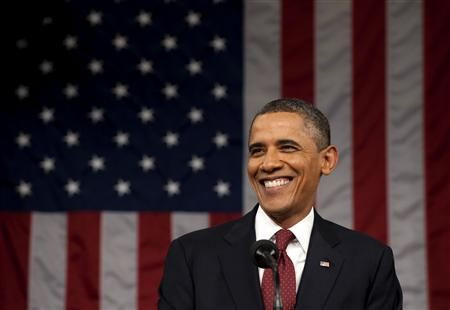President Obama: Meet President Obama

As Vladimir Putin resurrects Russia’s empire, China flexes its muscles in the Pacific, and Syria descends further into unimaginable horror, U.S. President Barack Obama should check out a speech from a few years back by a dynamic Democrat with lots to say about what the U.S. should do on the world stage.
In Europe, U.S. allies worry about Putin’s next move after America’s mock-worthy response to his Crimea adventure. In Asia, U.S. allies fret over America’s mushy response to Chinese claims of expanded air space. On both continents, our friends wonder whether Obama is rethinking America’s commitment to guaranteeing their security and its postwar role in keeping the global peace.
But, our dynamic Democrat harbored no doubts about what America had done and, presumably, should keep doing.
“America,” he said in one speech, “led the world in constructing an architecture to keep the peace: a Marshall Plan and a United Nations, mechanisms to govern the waging of war, treaties to protect human rights, prevent genocide, restrict the most dangerous weapons … We are the heirs of the fortitude and foresight of generations past, and it is a legacy for which my own country is rightfully proud.”
In Syria, Obama has called for Bashar al-Assad to step down but, rather than force the issue, he harbored the delusion that, through an international conference, he could orchestrate a negotiated settlement between a desperate dictator and determined rebels who increasingly include committed jihadists.
But, our dynamic Democrat recognized that no one like al-Assad will be sweet-talked into relinquishing power.
“A nonviolent movement could not have halted Hitler’s armies,” he said. “… [T]he world must remember that it was not simply international institutions -- not just treaties and declarations -- that brought stability to a post-World War II world. Whatever mistakes we have made, the plain fact is this: The United States of America has helped underwrite global security for more than six decades with the blood of our citizens and the strength of our arms. The service and sacrifice of our men and women in uniform has promoted peace and prosperity from Germany to Korea, and enabled democracy to take hold in places like the Balkans.”
In Syria, the U.S. looks away as 150,000 are dead, nine million have been driven from their homes, 5.5 million children need aid, and government forces and jihadist rebels slaughter innocents in ever-more creative ways. Al-Assad uses explosive barrels, missiles, and chemical weapons; jails and tortures peaceful activists; and blockades areas so children starve. Islamist rebels impose their strict ideology in neighborhoods under their control and, last week, shot a 7-year-old boy for apostasy.
But, our dynamic Democrat understood that, sometimes, force may be the only way to address history-making horror.
“I believe,” he said, “that force can be justified on humanitarian grounds, as it was in the Balkans, or in other places that have been scarred by war. Inaction tears at our conscience and can lead to more costly intervention later. That's why all responsible nations must embrace the role that militaries with a clear mandate can play to keep the peace.”
When moving beyond diplomacy to deter or punish aggression, Obama has favored sanctions over military force. In the wake of his toothless sanctions slap at Putin, however, our allies and adversaries alike now question whether the U.S. retains the gumption even to make sanctions real.
But, our dynamic Democrat understood that when choosing “alternative to violence,” they must be “tough enough to actually change behavior.”
“[I]f we want a lasting peace,” he said, “then the words of the international community must mean something. Those regimes that break the rules must be held accountable. Sanctions must exact a real price. Intransigence must be met with increased pressure -- and such pressure exists only when the world stands together as one.”
So, Obama’s got lots to learn from our dynamic Democrat who seems to understand how the world works.
Who's this Democrat? His name: Barack Obama. The date: Dec. 10, 2009. The setting: The Nobel Peace Prize ceremony in Oslo, Norway.
More than four years ago, President Obama gave perhaps his finest speech -- certainly his finest foreign policy speech. His words were savvy and sophisticated; his message was realistic and tough-minded.
His speech was gutsy, as well. The President had just received his Nobel Peace Prize not based on what he’d already done but, instead, based on the hopes that he’d prove a pacifist antidote to his forceful predecessor.
That day, a courageous Obama told a Western audience what it needed to hear. Today, he needs to re-read his own words and start acting on them.
Lawrence J. Haas, former communications director for Vice President Al Gore, is a senior fellow at the American Foreign Policy Council and author of “Sound the Trumpet: The United States and Human Rights Promotion.” Follow him on Twitter @larryhaasonline.
© Copyright IBTimes 2025. All rights reserved.





















